
Human babies are incredible. Indeed, the more we learn about them, the more we realise just how incredible they are! Not only are they little bundles of joy that have evolved in less than a year, but they also conceal some amazing secrets. Did you know, for example, that babies have gills (kind of), fur and a tail during their development in the womb — and that they have three times more taste buds than adults when they’re first born? In today’s article, we explore some fascinating baby facts that surprised us — and may surprise you! Take a look.
We Remember Nothing Before the Age of 3
Scientists are not completely sure why, but none of us tend to have memories that go back beyond the age of three. Can you recall anything from when you were 2 or 3 years old? The vast majority of us can’t, and it is believed to be because of two possible reasons. One possibility is that we can’t remember our earliest years because the memory system in our brains was not developed enough at that time. The other possibility is that it’s because memory could be tied to language, and our language skills were not sufficient to store memories until the age of three. It could also be a mixture of the two, perhaps.
Newborn Babies have Heart Rates Twice as Fast as Adults
Newborn babies have a heart rate of somewhere between 120 and 160 beats per minute. That’s around double that of adults!
4.44 Babies Are Born Every Second!*
Every second, an average of 4.44 new babies are born around the world*. That’s about 266 babies per minute and almost 16,000 per hour. On a daily basis, it works out to over 383,600 new babies per day and about 140 million every year. The world population is currently growing at a rate of 0.9% annually.
The Birth Rate in England & Wales is Falling
In England and Wales, 591,072 babies were born in 2023 according to the latest Office for National Statistics (ONS) data(¹). That is the lowest birth rate for the region since 1977, as well as being the first time the rate was below 600,000 since 2002. Indeed, women in England and Wales give birth to an average of just 1.44 children over their lifetimes in the latest data, which is the lowest on record.
September is the Most Popular Month for Baby Births
September remains the most popular month for births in England and Wales, according to the same ONS data. The most popular day for births was 28 September, a date that has been in the top ten days for births since 2021.
Boxing Day Has the Lowest Birth Rate
Boxing Day, 26 December, has the lowest birth rate for the whole year, according to the ONS. What’s more, this has been the case for 11 years in a row!
Parents Are Getting Older When Babies Are Born
Data analysed by the ONS over the last 50 years shows that, for babies born in England and Wales, parents are gradually getting older. In the last count (for 2023), a new baby’s father was, on average, 33.8 years of age, while mothers were 30.9.
Over Half the World’s Babies are Born in Asia*
Almost 53% of births happen across the continent of Asia, 30.7% across the African continent, 10.7% in the Americas and just 0.7% in Oceania. That compares to 5% of births that occur in Europe.
Babies Have Gills in the Womb (Kind of)
There has been much debate about whether foetuses — developing babies — have gills when they’re in the womb. The answer is ‘kind of’ according to many experts, including the late Dr Michael Mosley/BBC(∞). While they do have tiny gill-like folds called pharyngeal arches, which may be evidence that humans evolved from fish, they are not gills in the true sense of the word. The so-called ‘gill slits’ can be found on the foetus’s neck in the very early stages of development, but are not for breathing. Instead, the structures migrate and evolve into the top lip, palate, and jaw of the baby.
Human Foetuses Have Tails
In the early stages of development in the womb, human foetuses have tails, which even have vertebrae. However, around the 7th and 8th week of gestation, those vertebrae fuse together, and the tail disappears, leaving only the ‘tailbone’ or coccyx that we’re all born with.
Babies Grow Fur in the Womb
Lanugo is a soft, fine, usually colourless body hair that’s grown by babies in the womb and that eventually covers the baby’s whole body. In tandem with the creamy covering of vernix caseosa that babies are born with, the Lanugo fur’s purpose is to help protect the developing child and help regulate its temperature. Developed from about the 14th week and visible on the foetus’s skin from the 21st week of pregnancy, it is usually shed by about week 35, before birth. It is replaced by vellus hair, which is commonly known as ‘peach fuzz’ on newborns. That said, up to 30% of babies are born with lanugo hair still evident somewhere on their bodies, and this is especially true for premature babies. (Source).
Babies Have 3 Times More Taste Buds Than Adults
Did you know that newborn babies have three times more taste buds than adults? It’s true! Newborn babies have around 30,000 taste buds, whereas adults have no more than 10,000. However, in a newborn, the taste buds are distributed not only over the tongue, but also the palate, throat lining, and tonsils. It is thought that this helps them better identify advantageous foods over potentially toxic ones. That said, the number of taste buds gradually reduces as the infant gets older, eventually being present only on the tongue, as with adults.
Babies Have Almost 50% More Bones Than Adults
Similarly, babies are born with many more bones than adults. It may surprise you to learn that a baby has 300 bones in their body when born, whereas an adult has only 206. As they mature and grow, however, some bones in children fuse together to form single bones. A great example of this can be found in the human skull, which, in babies, consists of several separate bones which, come adulthood, have fused together into a single bone. It is through this kind of process that humans reduce the number of bones in their bodies by almost one-third.
Babies Do Not Cry Tears When First Born
We all know that a baby’s first cry is an important milestone and one that signals that the child is breathing. However, not all of us may notice that most babies do not cry actual tears during the first part of their infancy. That’s because their tear ducts — or lacrimal glands — are not yet fully mature. As such, it may be several weeks or even as long as 2 or 3 months before normal tears are evident when a baby cries. Premature babies usually take the longest to exhibit full tears when crying.
Babies’ Brains Double in Size in the First Year
During the early years, a child’s brain grows rapidly. In the first year alone, babies’ brains double in size and, by the time they’re three, are already four-fifths the size of an adult’s. By the age of five, they’re usually nine-tenths the size of an adult’s brain. That said, traditional wisdom suggests that the human brain continues to develop right into a person’s mid-twenties. However, some experts now believe that some areas of the brain continue to mature right into the thirties.
We hope you found today’s list of fascinating baby facts interesting. We may follow up with another set of fascinating baby facts in a future post, so watch this space!
High-Quality Childcare in Clayton-le-Woods
Little Acorns Nursery: a first-class weekday childcare service for Under-5s near Chorley

 Little Acorns Nursery provides families with a first-class childcare service in Clayton-le-Woods, Chorley. We have a Good Ofsted rating and support free childcare funding schemes for eligible working families with children as young as just 9 months of age. Little Acorns represents a fabulous choice for weekday childcare, which we provide for babies and children under five. Contact us today to apply for a nursery place or to learn more — we’d love to hear from you.
Little Acorns Nursery provides families with a first-class childcare service in Clayton-le-Woods, Chorley. We have a Good Ofsted rating and support free childcare funding schemes for eligible working families with children as young as just 9 months of age. Little Acorns represents a fabulous choice for weekday childcare, which we provide for babies and children under five. Contact us today to apply for a nursery place or to learn more — we’d love to hear from you.
Located in Clayton-le-Woods, Little Acorns Nursery will also be conveniently close for families in Clayton Brook, Clayton Green, Thorpe Green, Pippin Street, Buckshaw Village, Whittle-le-Woods, Farington, Bamber Bridge, Lostock Hall, Euxton, Leyland, and Penwortham.
* (Correct at the time of writing — 12 December 2025 — according to the Live Birth Counter).


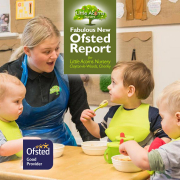
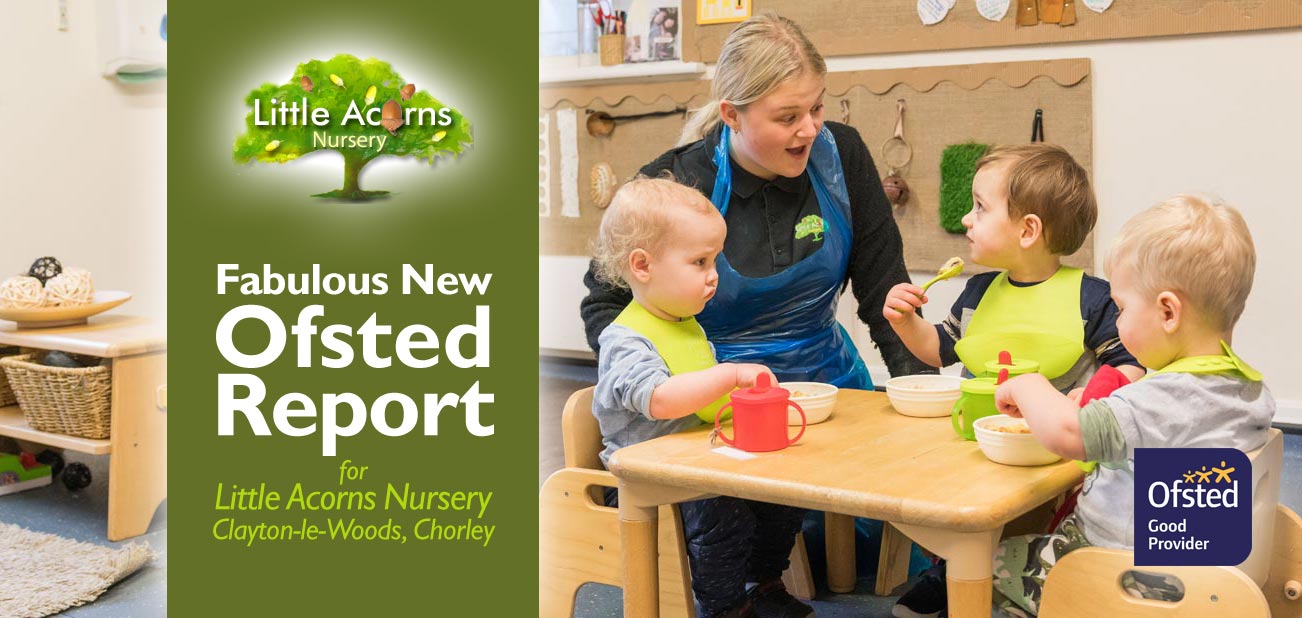
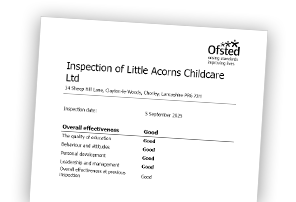 Overall effectiveness: Good
Overall effectiveness: Good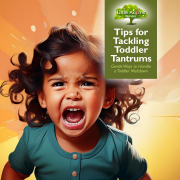

 In their earliest years, children’s brains are doing a phenomenal amount of developing. At this stage, little ones understand far more than they can express, and they’re learning to handle powerful emotions without the calm reasoning skills adults (mostly) have. The part of the brain responsible for emotional control is still under construction, so when they’re hungry, tired, frustrated, or simply want something right now, they can easily become overwhelmed. In short, they’re not trying to give you a hard time. They’re having a hard time.
In their earliest years, children’s brains are doing a phenomenal amount of developing. At this stage, little ones understand far more than they can express, and they’re learning to handle powerful emotions without the calm reasoning skills adults (mostly) have. The part of the brain responsible for emotional control is still under construction, so when they’re hungry, tired, frustrated, or simply want something right now, they can easily become overwhelmed. In short, they’re not trying to give you a hard time. They’re having a hard time. It’s not always easy as a parent, but your own composure is key. A calm, even tone and steady body language tell your child that you’re in control, even if you feel anything but. Also, try avoiding lengthy explanations in the heat of the moment — too many words can overwhelm an emotional toddler.
It’s not always easy as a parent, but your own composure is key. A calm, even tone and steady body language tell your child that you’re in control, even if you feel anything but. Also, try avoiding lengthy explanations in the heat of the moment — too many words can overwhelm an emotional toddler. The nightmare scenario: You’re halfway down the biscuit aisle when your toddler takes an unhealthy shine to a chocolate-covered, sugar-filled snack that’s really not going to be good for them. So, you say no. They flop to the floor, wail at a volume that seems to fill the entire supermarket, and protest in a dramatic fashion that catches the attention of every shopper in the vicinity. Not only is your child in full, public, tantrum mode, but you’re also going to feel judged!
The nightmare scenario: You’re halfway down the biscuit aisle when your toddler takes an unhealthy shine to a chocolate-covered, sugar-filled snack that’s really not going to be good for them. So, you say no. They flop to the floor, wail at a volume that seems to fill the entire supermarket, and protest in a dramatic fashion that catches the attention of every shopper in the vicinity. Not only is your child in full, public, tantrum mode, but you’re also going to feel judged! Scenario: At home, your child sees their sibling or a friend playing with the toy they absolutely must have right now. They shout, try to grab the toy, and then the sobbing begins.
Scenario: At home, your child sees their sibling or a friend playing with the toy they absolutely must have right now. They shout, try to grab the toy, and then the sobbing begins. Scenario: Dinner is served, and your child takes one look at the plate and decides it’s the worst thing that’s ever happened to them. Cue gesticulating arms, shouting and, in all probability, some dramatic sliding under the table.
Scenario: Dinner is served, and your child takes one look at the plate and decides it’s the worst thing that’s ever happened to them. Cue gesticulating arms, shouting and, in all probability, some dramatic sliding under the table.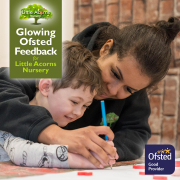
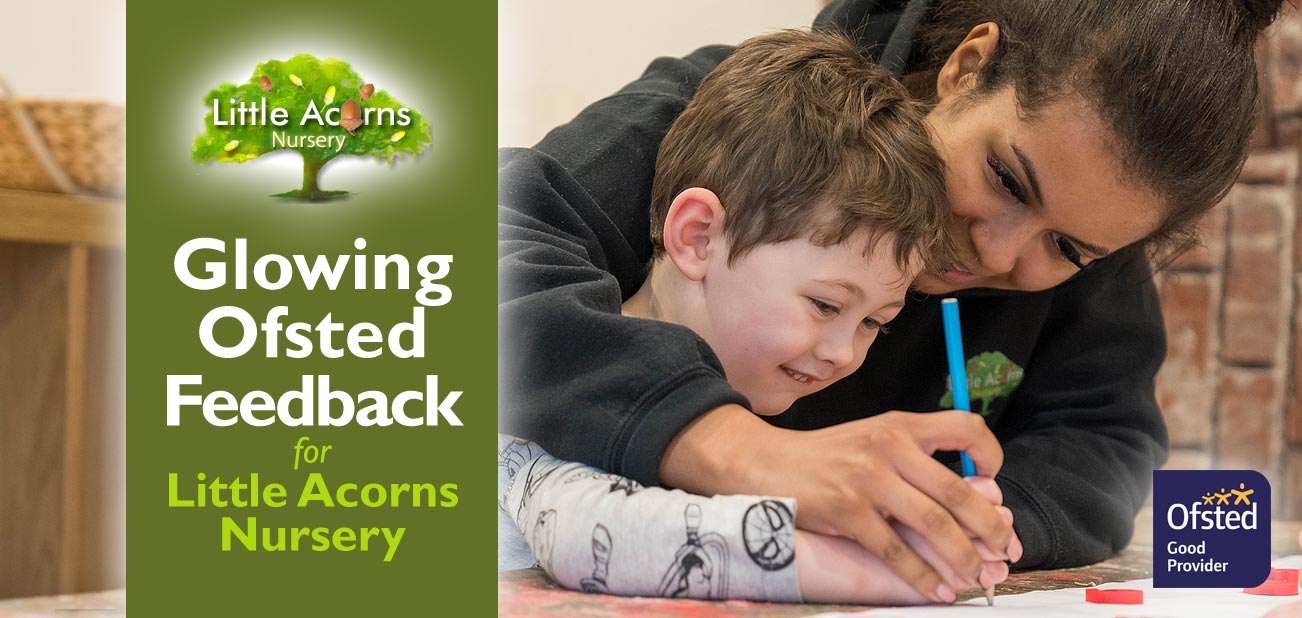
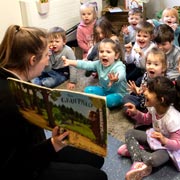 Today we look at the wonderful Ofsted report published recently for Little Acorns Nursery in Clayton-le-Woods, Chorley. Ofsted is The Office for Standards in Education, Children’s Services and Skills. Their inspector visited this fabulous Lancashire childcare setting in late August and released its official report a month later on 25 September 2024. Our post today spotlights some of the many glowing comments made by the inspector therein, following her visit. It also highlights the reasoning for ‘good provider’ ratings across all areas of the Ofsted report. Take a look and you’ll see why babies, children under five, and those with special educational needs and/or disabilities absolutely thrive at Little Acorns.
Today we look at the wonderful Ofsted report published recently for Little Acorns Nursery in Clayton-le-Woods, Chorley. Ofsted is The Office for Standards in Education, Children’s Services and Skills. Their inspector visited this fabulous Lancashire childcare setting in late August and released its official report a month later on 25 September 2024. Our post today spotlights some of the many glowing comments made by the inspector therein, following her visit. It also highlights the reasoning for ‘good provider’ ratings across all areas of the Ofsted report. Take a look and you’ll see why babies, children under five, and those with special educational needs and/or disabilities absolutely thrive at Little Acorns. Overall effectiveness: Good
Overall effectiveness: Good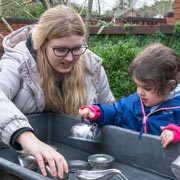 Any good nursery or childcare provider will ensure that children understand right from wrong and are mindful of the effect their actions have on others, including peers. Nurturing good manners and appropriate behaviour amongst little ones benefits everyone including, of course, the children themselves. Ofsted’s latest report recognised that Little Acorns is very successful in this regard:
Any good nursery or childcare provider will ensure that children understand right from wrong and are mindful of the effect their actions have on others, including peers. Nurturing good manners and appropriate behaviour amongst little ones benefits everyone including, of course, the children themselves. Ofsted’s latest report recognised that Little Acorns is very successful in this regard: Children find messy play hugely rewarding as well as being immense fun. Messy play nurtures children’s imaginations, creativity, dexterity, and self-expression and benefits them in many other ways. It is therefore a crucial part of early years learning and development — and more important than it perhaps sounds. Ofsted picked up on the quality of messy play activities at Little Acorns Nursery within its report:
Children find messy play hugely rewarding as well as being immense fun. Messy play nurtures children’s imaginations, creativity, dexterity, and self-expression and benefits them in many other ways. It is therefore a crucial part of early years learning and development — and more important than it perhaps sounds. Ofsted picked up on the quality of messy play activities at Little Acorns Nursery within its report: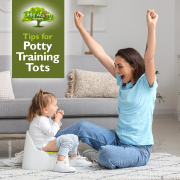
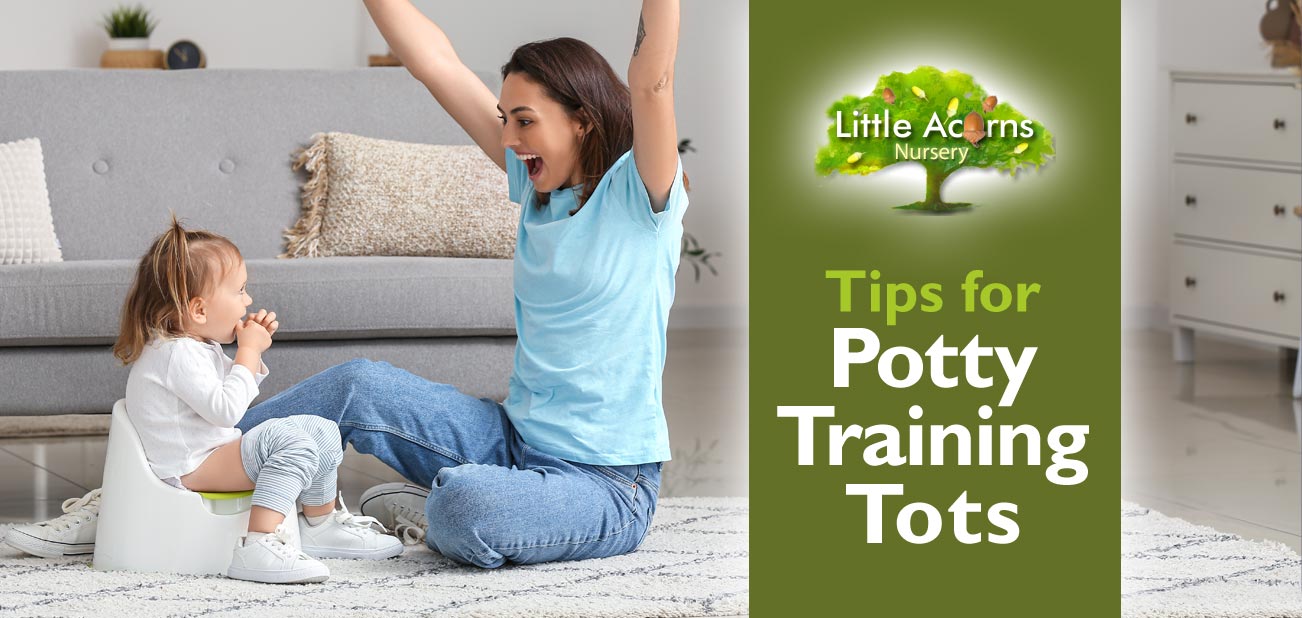
 One of the key tasks all tots must face, in tandem with parents, is potty training. It’s something we all had to master as toddlers and therefore we know it’s 100% achievable — despite it sometimes seeming to be rather a challenge. Achieving success, though, will improve the quality of life for the child, the parent, and other guardians involved in the child’s care. Learning to master the use of the potty and later the toilet will also be a major boost to self-confidence and independence when the child is at nursery, preschool, and later school. With that in mind, today’s guide outlines our top tips for successful potty training.
One of the key tasks all tots must face, in tandem with parents, is potty training. It’s something we all had to master as toddlers and therefore we know it’s 100% achievable — despite it sometimes seeming to be rather a challenge. Achieving success, though, will improve the quality of life for the child, the parent, and other guardians involved in the child’s care. Learning to master the use of the potty and later the toilet will also be a major boost to self-confidence and independence when the child is at nursery, preschool, and later school. With that in mind, today’s guide outlines our top tips for successful potty training.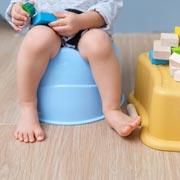 Children become ready for potty training at different times — every child is different in that respect, with some starting as early as 18 months and others not training until the age of 3. That said, the majority of little ones begin potty training between the ages of 2 and 3. There are some signs to look out for that will help parents decide when the time is right and we’ll look at those below.
Children become ready for potty training at different times — every child is different in that respect, with some starting as early as 18 months and others not training until the age of 3. That said, the majority of little ones begin potty training between the ages of 2 and 3. There are some signs to look out for that will help parents decide when the time is right and we’ll look at those below. Ensuring children understand the language around toileting is helpful, of course. So, it’s healthy to help children learn the various terms involved, whether talking about a potty, wee-wees, or anything else. Learning appropriate words will empower children to ask for what they need, at appropriate times.
Ensuring children understand the language around toileting is helpful, of course. So, it’s healthy to help children learn the various terms involved, whether talking about a potty, wee-wees, or anything else. Learning appropriate words will empower children to ask for what they need, at appropriate times. Potties with designs that are attractive to toddlers e.g. dinosaurs, licensed TV characters etc.
Potties with designs that are attractive to toddlers e.g. dinosaurs, licensed TV characters etc.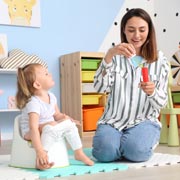 Only start potty training when your child shows signs that they’re ready. (See the When Should You Begin Potty Training? section above for details).
Only start potty training when your child shows signs that they’re ready. (See the When Should You Begin Potty Training? section above for details).
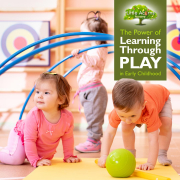
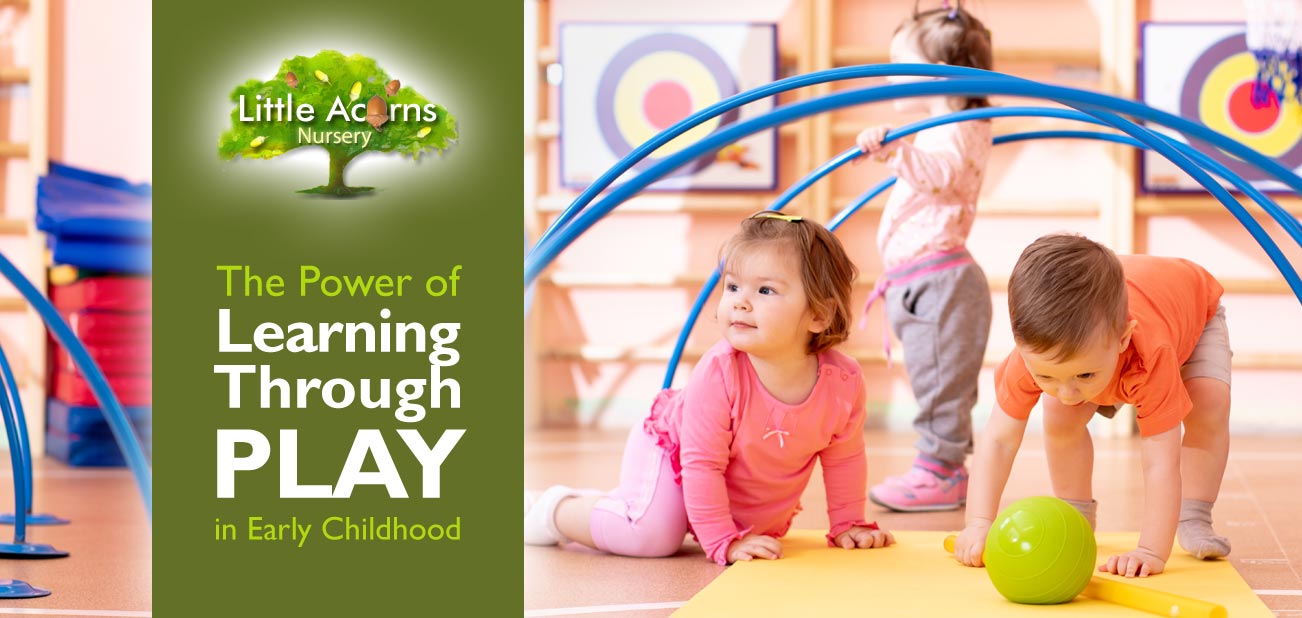
 In the world of child development and early education, there is a simple yet profound truth: children learn best when they are learning through play. Play is the universal language of childhood and, indeed, it transcends both borders and cultures. Whether it’s building sand castles on a sunny beach or arranging blocks on the floor at home, play is the gateway through which children explore, discover, and grow.
In the world of child development and early education, there is a simple yet profound truth: children learn best when they are learning through play. Play is the universal language of childhood and, indeed, it transcends both borders and cultures. Whether it’s building sand castles on a sunny beach or arranging blocks on the floor at home, play is the gateway through which children explore, discover, and grow. As adults, we often associate learning with classrooms, textbooks, and structured lessons. However, for children, the process of learning is a dynamic and ever-evolving adventure, with play being their very best companion during the journey.
As adults, we often associate learning with classrooms, textbooks, and structured lessons. However, for children, the process of learning is a dynamic and ever-evolving adventure, with play being their very best companion during the journey. Do babies benefit from play? Absolutely. Play is the first way through which infants start understanding their world. They use their senses to explore toys, grasp objects, and make sense of the environment around them. Sensory play, such as touching different textures or listening to soothing sounds, stimulates their developing senses and lays the groundwork for future learning.
Do babies benefit from play? Absolutely. Play is the first way through which infants start understanding their world. They use their senses to explore toys, grasp objects, and make sense of the environment around them. Sensory play, such as touching different textures or listening to soothing sounds, stimulates their developing senses and lays the groundwork for future learning. During the run-up to the age of 5, play is integral to children’s development. During this phase, children are like little sponges, soaking up information from their surroundings. Play allows them to experiment, make connections, and refine their cognitive and many other skills. Skills enhanced through play include:
During the run-up to the age of 5, play is integral to children’s development. During this phase, children are like little sponges, soaking up information from their surroundings. Play allows them to experiment, make connections, and refine their cognitive and many other skills. Skills enhanced through play include: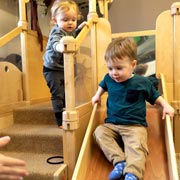 Creating playful environments — we understand the importance of a conducive environment for learning through play. With that in mind, we provide carefully designed play spaces that are rich in stimulating materials and resources. These spaces allow children to engage in various types of play, from imaginative to sensory, in a safe and supportive setting.
Creating playful environments — we understand the importance of a conducive environment for learning through play. With that in mind, we provide carefully designed play spaces that are rich in stimulating materials and resources. These spaces allow children to engage in various types of play, from imaginative to sensory, in a safe and supportive setting.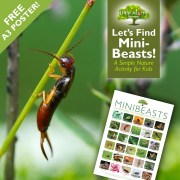
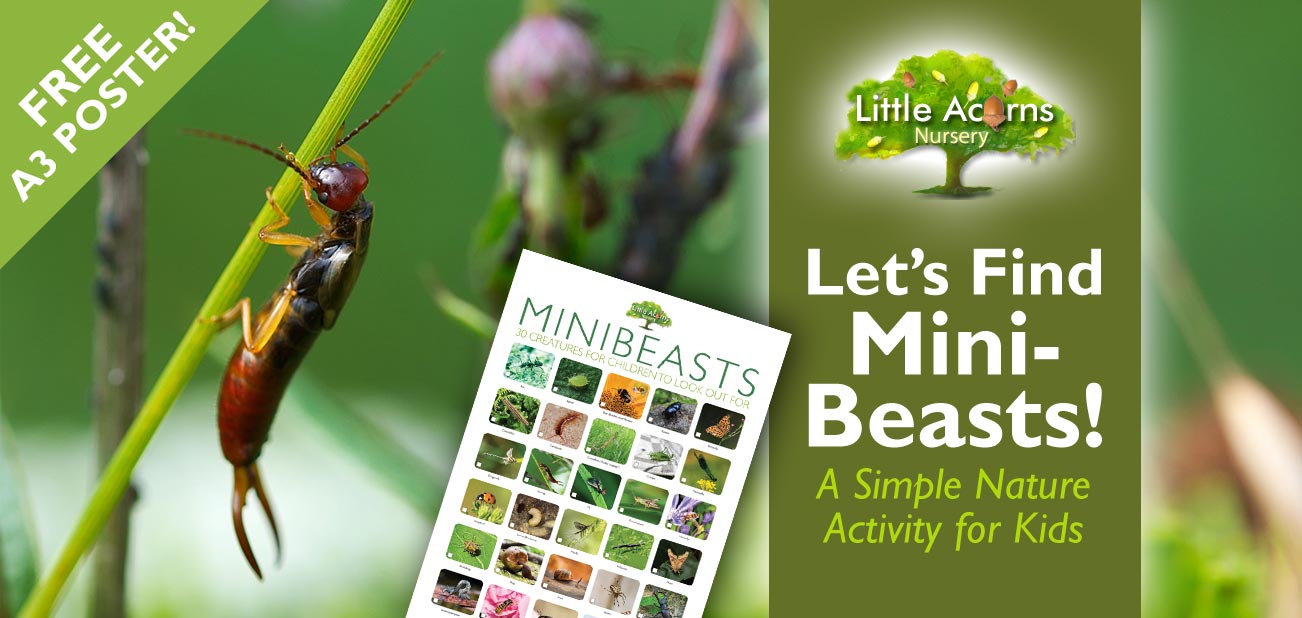
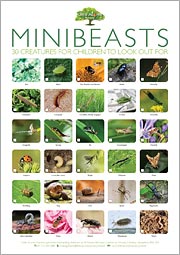 Children and parents, let’s go minibeast spotting! Whether you have a garden, neighbourhood park, or just a few potted plants, there are bound to be minibeasts visiting or living there. What’s more, summer is the perfect time to spot them. Spending time in
Children and parents, let’s go minibeast spotting! Whether you have a garden, neighbourhood park, or just a few potted plants, there are bound to be minibeasts visiting or living there. What’s more, summer is the perfect time to spot them. Spending time in 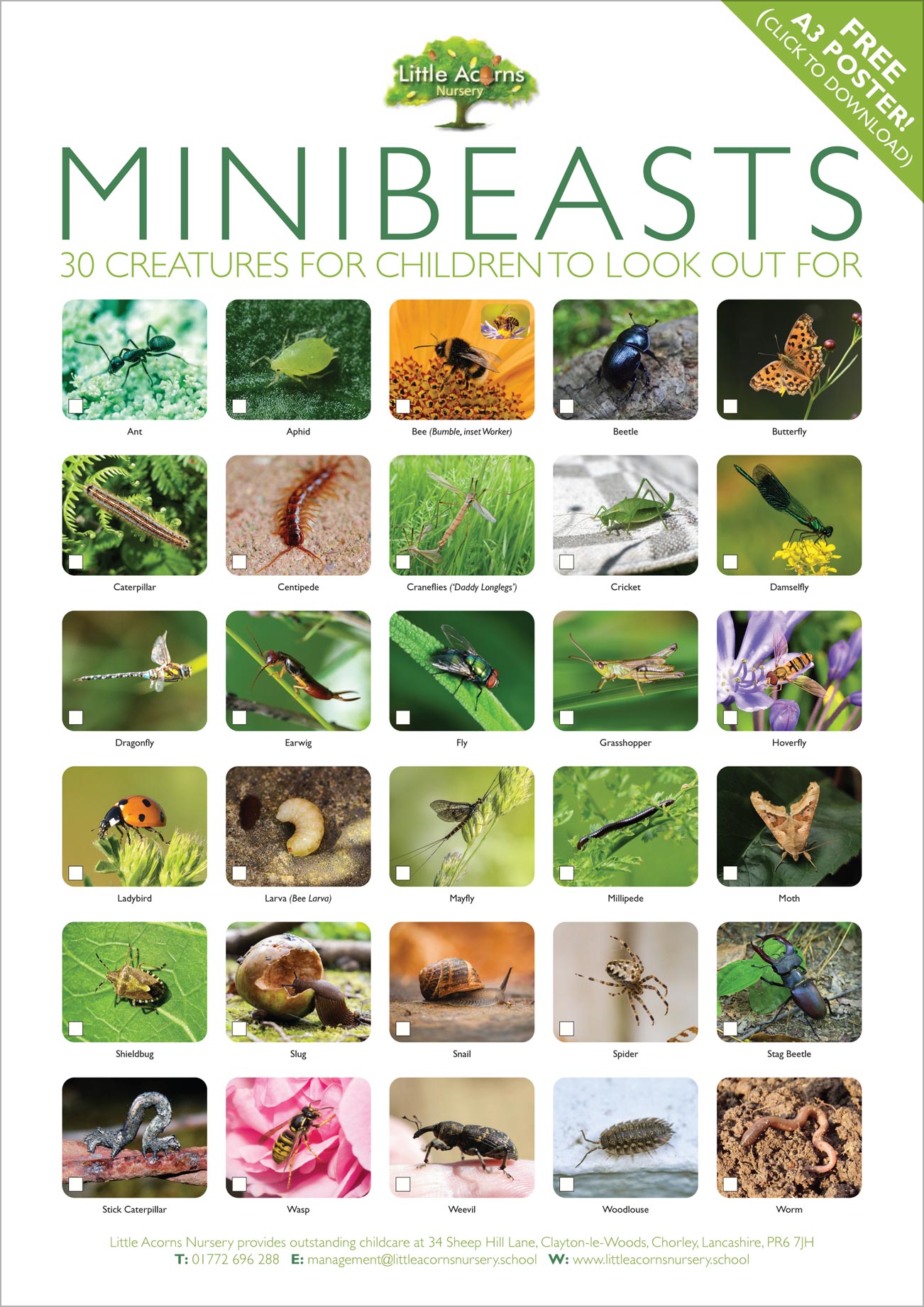
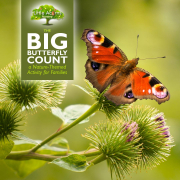
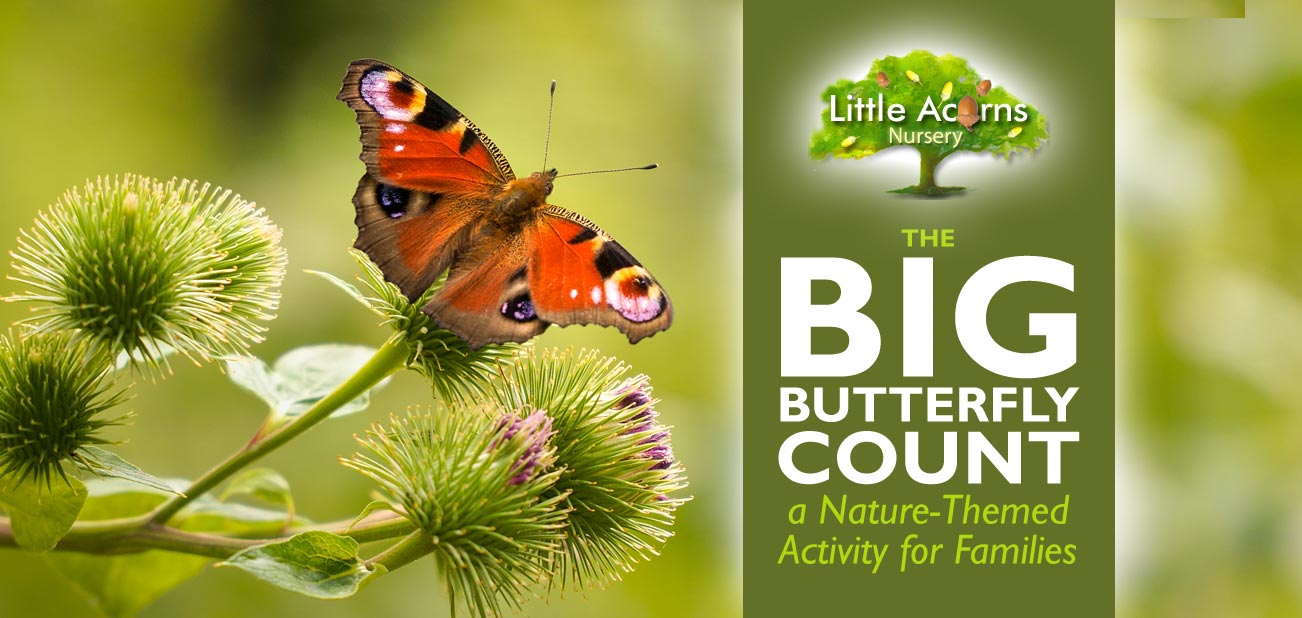
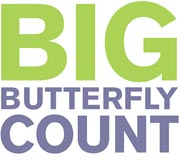 Many will have heard of the Big Garden Birdwatch that takes place every year in January. However, fewer are aware of a similar activity called The Big Butterfly Count that takes place in July and early August. As well as being extremely worthwhile, it’s a wonderful activity for both children and adults to get involved in as citizen scientists. The activity helps with butterfly conservation, is educational for those taking part, and encourages families to get outdoors, closer to nature. And, as we know,
Many will have heard of the Big Garden Birdwatch that takes place every year in January. However, fewer are aware of a similar activity called The Big Butterfly Count that takes place in July and early August. As well as being extremely worthwhile, it’s a wonderful activity for both children and adults to get involved in as citizen scientists. The activity helps with butterfly conservation, is educational for those taking part, and encourages families to get outdoors, closer to nature. And, as we know, 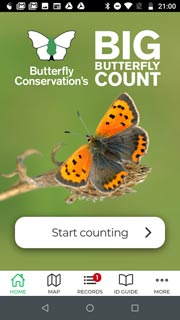
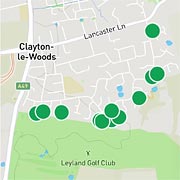
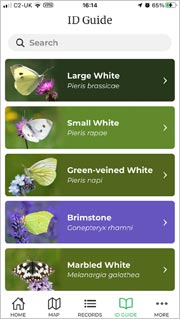
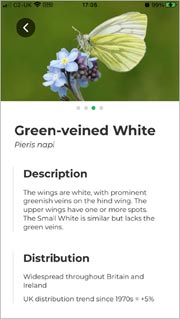
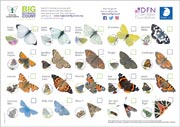
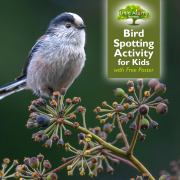
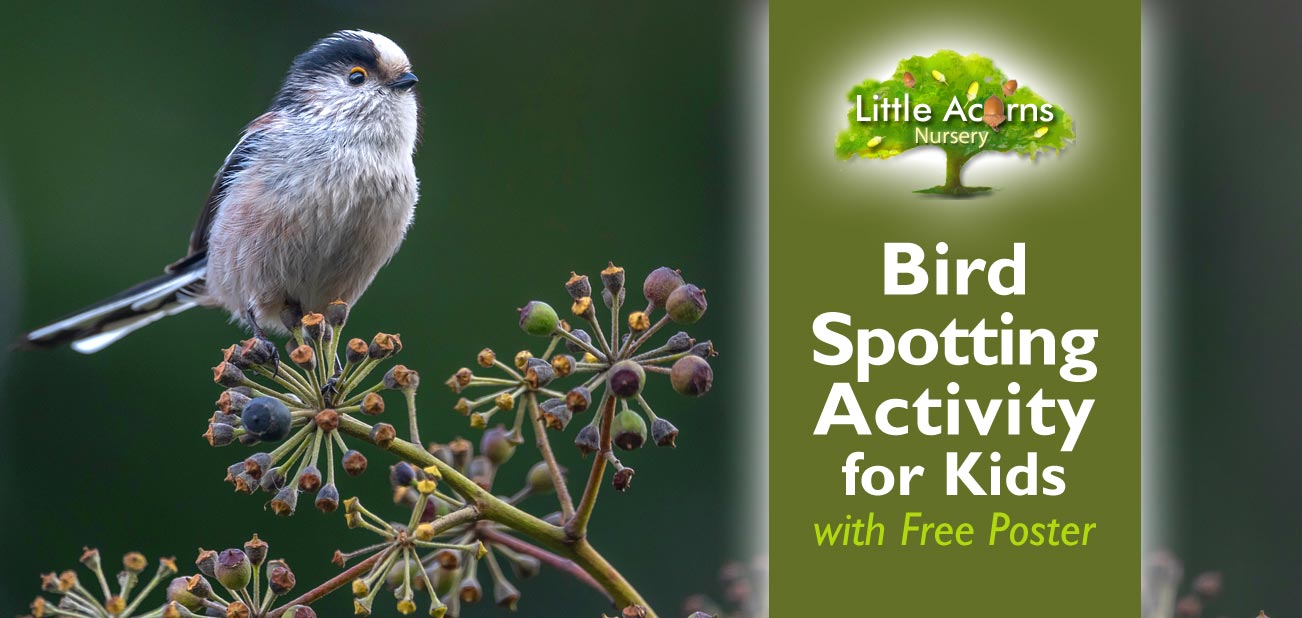
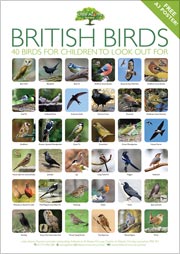 Are you looking for a fun and educational activity for your children? Why not encourage them to do some bird spotting? Not only is it a great way to spend time outdoors, but it’s also a wonderful opportunity for them to learn about nature and develop observation skills. As we know,
Are you looking for a fun and educational activity for your children? Why not encourage them to do some bird spotting? Not only is it a great way to spend time outdoors, but it’s also a wonderful opportunity for them to learn about nature and develop observation skills. As we know, 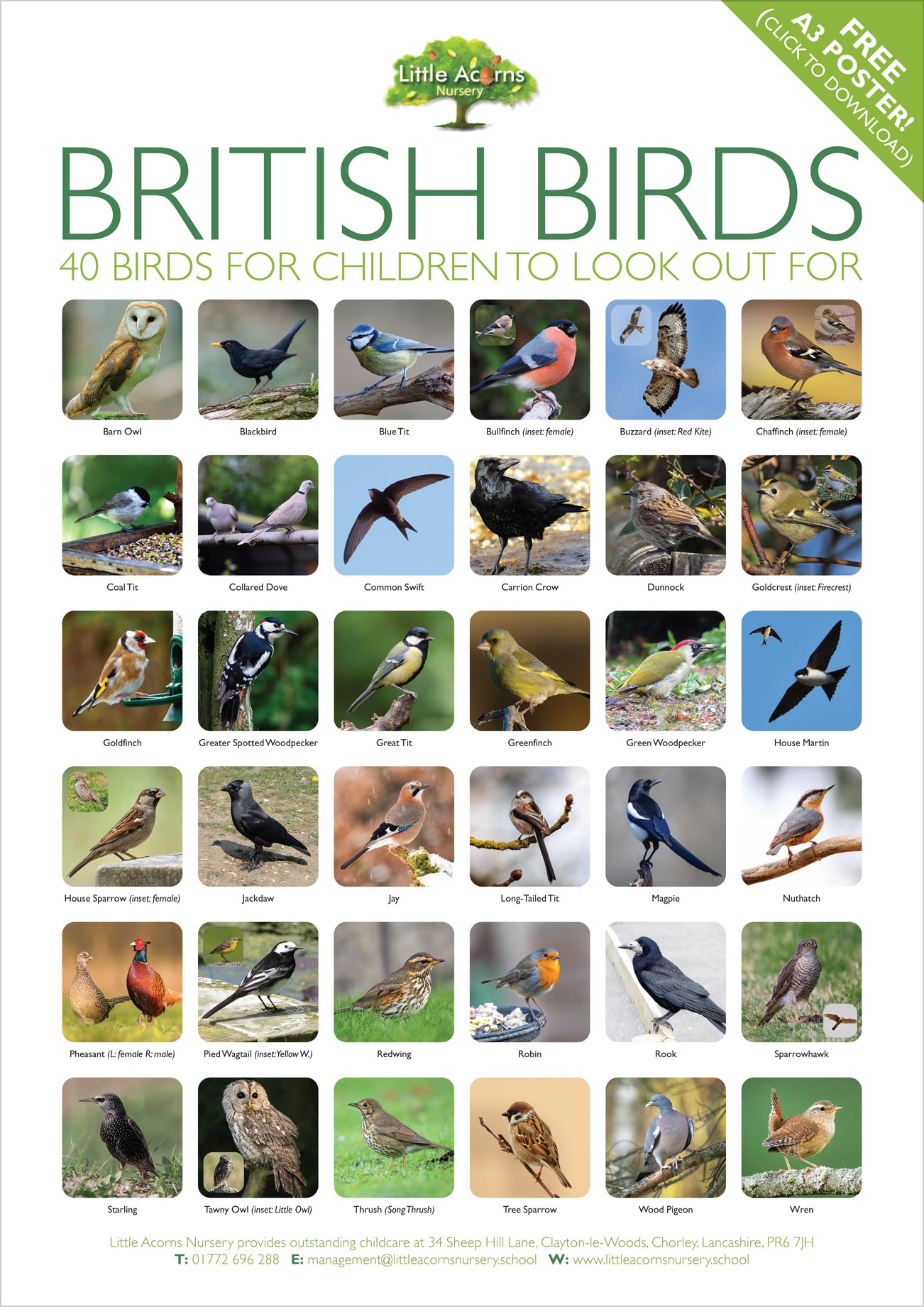
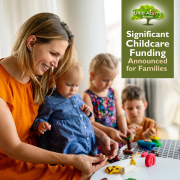
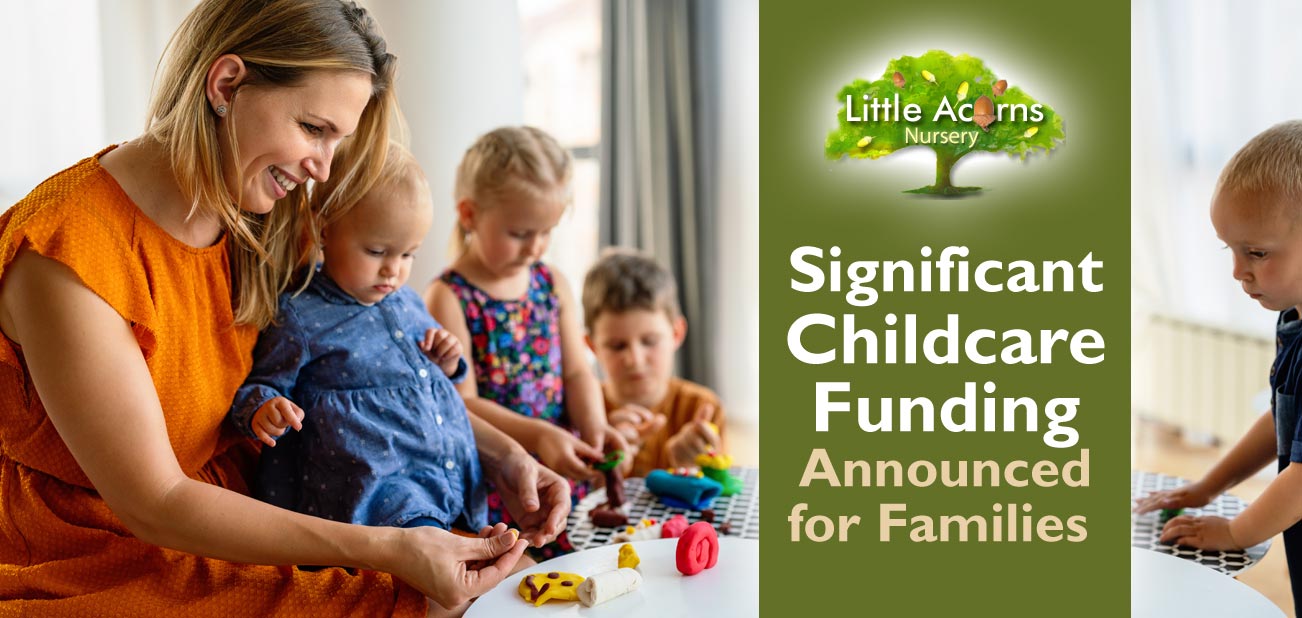
 parents to return to the workplace sooner after the birth of their child if they so choose;
parents to return to the workplace sooner after the birth of their child if they so choose; children aged 2 from eligible working families will be able to claim 570 hours of free childcare each year. This is typically taken as 15 hours of free childcare each week over 38 weeks, although exactly how it’s taken may be agreed otherwise between the family and the childcare provider.
children aged 2 from eligible working families will be able to claim 570 hours of free childcare each year. This is typically taken as 15 hours of free childcare each week over 38 weeks, although exactly how it’s taken may be agreed otherwise between the family and the childcare provider. Until now, 87% of those eligible to claim childcare support through Universal Credit were not doing so. One of the main reasons for this was that it’s geared towards low-income families yet required them to pay childcare fees in advance — and later claim them back. Paying in advance is not so easy when household income is low, as is typically the case for households that would otherwise be eligible. For this reason, another of the Chancellor’s initiatives announced in the Spring Budget 2023 is to roll out the following improvements:
Until now, 87% of those eligible to claim childcare support through Universal Credit were not doing so. One of the main reasons for this was that it’s geared towards low-income families yet required them to pay childcare fees in advance — and later claim them back. Paying in advance is not so easy when household income is low, as is typically the case for households that would otherwise be eligible. For this reason, another of the Chancellor’s initiatives announced in the Spring Budget 2023 is to roll out the following improvements: The final childcare-related initiative in the Chancellor’s Spring Budget aims to fix another key problem for parents: how to juggle their own longer working hours with their child’s shorter school hours. When a child attends school, they often finish their school day several hours before their parent is finished at work, for example. There is therefore a childcare requirement to bridge the gap and this may be required both at the start and end of the child’s school day. In view of this, the Chancellor announced the piloting of a new Wraparound Pathfinder Scheme, which would fund childcare hours from 8 am until the start of the school morning and, later in the day, fund childcare for the mismatched afternoon hours up to 6 pm. The pilot will test the scheme to see how well it works. If successful, the Chancellor aims to roll it out to the whole of the UK from September 2024.
The final childcare-related initiative in the Chancellor’s Spring Budget aims to fix another key problem for parents: how to juggle their own longer working hours with their child’s shorter school hours. When a child attends school, they often finish their school day several hours before their parent is finished at work, for example. There is therefore a childcare requirement to bridge the gap and this may be required both at the start and end of the child’s school day. In view of this, the Chancellor announced the piloting of a new Wraparound Pathfinder Scheme, which would fund childcare hours from 8 am until the start of the school morning and, later in the day, fund childcare for the mismatched afternoon hours up to 6 pm. The pilot will test the scheme to see how well it works. If successful, the Chancellor aims to roll it out to the whole of the UK from September 2024.